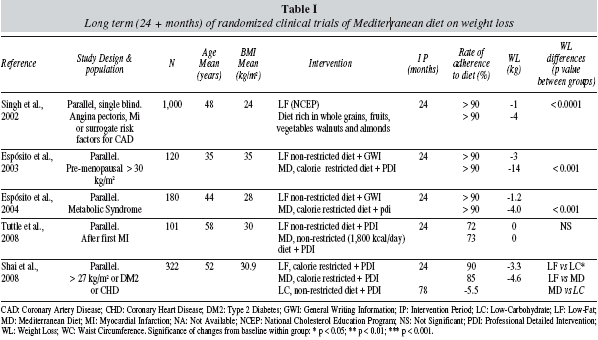Mi SciELO
Servicios Personalizados
Revista
Articulo
Indicadores
-
 Citado por SciELO
Citado por SciELO -
 Accesos
Accesos
Links relacionados
-
 Citado por Google
Citado por Google -
 Similares en
SciELO
Similares en
SciELO -
 Similares en Google
Similares en Google
Compartir
Nutrición Hospitalaria
versión On-line ISSN 1699-5198versión impresa ISSN 0212-1611
Nutr. Hosp. vol.24 no.6 Madrid nov./dic. 2009
Long term effect of Mediterranean diet on weight loss
Dieta mediterránea, pérdida de peso y cambio de lípidos
Trends of obesity show a steady increase in most of the Mediterranean countries, where consumption of Mediterranean diet (MD) is naturally high and olive oil is a major contributor of energy in the diets. This paper presents a systematically reviewed of Randomized Control Trials (RCT) studying long-term effect (≥ 24 months) of MD diet on weight loss. PubMed database was searched up to July 2008 to identify RCT on MD with a follow-up equal or higher than 24 months and reporting weight loss. It was used as descriptor and as text format, the term MD with other key word (s):"obesity", "overweight", "weight loss", "weight gain","body mass index" (BMI), "biological markers", "lipids", "cholesterol". All human studies including RCT and weight or BMI were included. Additional publications were identified from references provided in original and other review papers. A total of five studies were identified with a follow-up equal or higher than 24 months or higher1-5 (table I).
The long-term results of RCT show that Low Fat Diet (LFD) and MD could be similarly effective strategies for weight lost, particularly when applied with equal intensity interventions and a calorie deficit is achieved. The studies demonstrating effective weight lost with the MD were prescribing energy-restricted diets1-3. Those showing a better effect of MD on weight lost did not compare the experimental group with similar intervention strategies, since control group did not include regular nutritionist counseling and behavioral modification techniques1,2.
Weight loss observed in the studies reviewed was due to the energy deficits in the diets rather than the type of diet. Since obesity is the result of positive energy balance due to excess calorie intake, low calorie expenditure or both, promoting increasing edible fat, including olive oil could be a risk to susceptible individuals and some populations with very high intake of olive oil. The evidence points toward a more practical approach at Mediterranean countries where obesity and overweight is increasing. It might be necessary promoting the reduction of all food items, including olive oil when olive consumption is higher than 20-25 g day and when the fat content of the diet is higher than 35%. This measure, in most Mediterranean countries, will still maintain the high monounsaturated saturated ratio that has been proven to be healthy.
These results suggest that a culturally base low calorie diet, reducing all fats and carbohydrates, might be the best approach for the prevention of overweight and obesity.
A. Jiménez-Cruz1, A. B. Jiménez2,3, A. Pichardo-Osuna2, T. Chaudry2,3 and M. Bacardi-Gascon1
1Professor at the Medical School. Graduate Nutrition Program. Universidad Autónoma de Baja California. Tijuana, B. C. México.
2Research Asistant at the Graduate Nutrition Program. Universidad Autónoma de Baja California. Tijuana, B. C. México.
3Graduado del Departamento de Biología Molecular. UCLA.
4Estudiante de Enfermería. UCLA. USA.
References
1. Esposito K, Pontillo A, Di Palo C, Giugliano G, Masella M, Marfella R, Giugliano D. Effect of weight loss and lifestyle changes on vascular inflammatory markers in obese women. JAMA 2003; 289: 1799-1804. [ Links ]
2. Esposito K, Marfella R , Ciotola M, Di Palo C, Giugliano F, Giugliano G, Armiento M, D'Andrea F, Giugliano D. Effect of a Mediterranean-style diet on endothelial dysfunction and markers of vascular inflamation in the metabolic syndrome. JAMA 2004; 292: 1440-1446. [ Links ]
3. Shai I, Schwarzfuchs D, Henkin Y, Shahar DR, Witkow S, Greenber I, Golan R, Fraser D, Boltin A, Vardi H, Tangi-Rozental O, Zuk-Ramot R, Sarusi B, Brickner D, Schwartz Z, Sheiner E, Marko R, Katorza E, Thiery J, Fiedler GM, Bluher M, Stumvoll M, Stampfer MJ. Weight loss with a low-carbohydrate, Mediterranean, or Low-Fat diet. N Engl J Med 2008; 359: 229-241. [ Links ]
4. Singh RB, Dubnov G, Niaz MA, Ghosh S, Singh R, Rastogi SS, Manor O, Pella D, Berry EM. Effect on an Indo-Mediterranean diet on progression of coronary artery disease in high risk patients (Indo-Mediterranean Diet Heart Study): a randomised singleblind trial. Lancet 2002; 360: 1455-61. [ Links ]
5. Tuttle KR, Shuler LA, Packard DP, Milton JE, Daratha KB, Bibus DM, Short RA. Comparison of low-fat versus Mediterranean-style dietary intervention after first myocardial infarction (from the Heart Institute of Spokane Diet Intervention and Evaluation Trial). Am J Cardiol 2008; 101: 1523-1530. [ Links ]
![]() Correspondence:
Correspondence:
Arturo Jiménez-Cruz.
Unidad Universitaria Calzada Tecnológico.
14418 Mesa de Otay.
22390 Tijuana, B. C. México.
E-mail: ajimenez@uabc.mx
Recibido: 21-VII-2009.
Aceptado: 9-VIII-2009.















